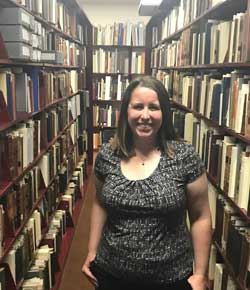Turning the Page: Elizabeth Palmer, ’10, Returns to Albion as Archivist
Related Posts
Connect With Us
August 20, 2019
By Chuck Carlson
Elizabeth Palmer’s mother is a teacher. So is her father. Her sister? She’s a teacher, too.
“My aunts and uncles, they’re all teachers,” she says.

Elizabeth Palmer, ’10, has returned to Albion College as its new Marilyn Crandell Schleg Archivist and Special Collections Librarian
She smiles.
“I’m in a nontraditional teaching environment,” Palmer says.
Perhaps. But while Palmer, ‘10, isn’t a teacher in the classic sense, that doesn’t mean she isn’t teaching. And in her case, as Albion College’s new Marilyn Crandell Schleg Archivist and Special Collections Librarian, she is educating those who may only have a passing knowledge of the wonders that reside in Stockwell-Mudd Library.
“I want to make sure people know about the collection that’s available,” says Palmer, who began her new job in July. “I’m of a mind that why do we have it if it’s not benefiting others? As a student I knew about the archives, but I didn’t know about the rare books.”
And for a small college, Albion’s collection is indeed special.
It includes documents from the United Methodist Church. It has bibles in nearly every language. There are documents and books from early America, a first-edition Book of Mormon, a restored King James Bible from 1611 and artifacts that trace the start of Albion College. It is a treasure trove for the bibliophile, and while it’s too fragile and valuable to be open to the public 24 hours a day, requests to visit for research purposes are always welcome.
“It’s important to have things be as accessible as possible to research,” Palmer says.
Indeed, she has spent her first weeks on the job roaming the aisles and poking through drawers just to acquaint herself with what’s available.
“I’ve been learning a lot,” she says. “I thought I was pretty familiar with Albion’s history but I’m learning a lot more.”
Drawn to Historic Preservation
It’s a direction the Zeeland, Michigan, native hadn’t expected when she was first attracted to Albion as a student for its music program.
Not surprisingly, Palmer was planning on a career as a music education teacher. She played trumpet in the band, was a member of the British Eighth and also performed with the Briton Singers.
She majored in organizational communications and vocal music, but then started moving away from the idea of teaching.
“I loved libraries and I loved museums as a kid,” she says. “I was the kid who got angry when I could only check out 20 books at a time. Education was my family’s thing, but it wasn’t what I wanted to do.”
She was intrigued by historic preservation and took that interest to Eastern Michigan University, where she earned her master’s of science in historic preservation.
And, just as she did as a youngster, she spent hours in the library, working in EMU’s Halle Library, specifically in the University Archives, soaking in as much as she could.
“I gained a lot of hands-on experience,” Palmer says. “It was like a lightbulb had turned on and I asked myself why hadn’t I thought of this before. I had never even considered this as an option before.”
Upon graduation from EMU in 2013, she soon was hired at the Ella Sharp Museum in Jackson, where she held various roles from archives manager to museum manager and then curator of the collection.
As the new archivist at Albion, Palmer is still learning just what that really entails. The rare books collection sits adjacent to her office and offers an array of publications that, likely, most students as well as faculty and alumni may not even know exists.
“It’s always interesting to see what you have and what you don’t have,” she says
Connections to Campus
For Palmer, returning to Albion is special because this was where some of the best times in her life occurred.
She met her husband, Daniel Palmer, ’11, while a student, and he’s on campus, too, teaching guitar in the Music Department as an adjunct.
“I loved my time here as a student,” she says. “I have most everything I have today because of Albion. I learned how I wanted to live my life at Albion. Albion gave me everything.”
And in her new role she wants to help show the students of the future just how important the past continues to be.
“This is our history,” Palmer says. “It tells you who you are. Why do people paint the Rock? It gives you a sense of self.”